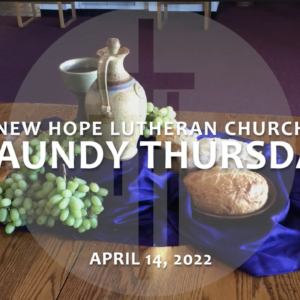John 13:1-17, 31b-35
1 Now before the festival of the Passover, Jesus knew that his hour had come to depart from this world and go to God. Having loved his own who were in the world, Jesus loved them to the end. 2 The Tempter had already put it into the heart of Judas son of Simon Iscariot to betray Jesus. And during supper 3 Jesus, knowing that God had given all things into his hands, and that he had come from God and was going to God, 4 got up from the table, took off his outer robe, and tied a towel around himself. 5 Then he poured water into a basin and began to wash the disciples’ feet and to wipe them with the towel that was tied around him. 6 Jesus came to Simon Peter, who said to him, “Lord, are you going to wash my feet?” 7 Jesus answered, “You do not know now what I am doing, but later you will understand.” 8 Peter said to him, “You will never wash my feet.” Jesus answered, “Unless I wash you, you have no share with me.” 9 Simon Peter said to him, “Lord, not my feet only but also my hands and my head!” 10 Jesus said to him, “One who has bathed does not need to wash, except for the feet, but is entirely clean. And you are clean, though not all of you.” 11 For Jesus knew who was to betray him; for this reason he said, “Not all of you are clean.”
12 After Jesus had washed their feet, had put on his robe, and had returned to the table, he said to them, “Do you know what I have done to you? 13 You call me Rabbi and Lord—and you are right, for that is what I am. 14 So if I, your Lord and Rabbi, have washed your feet, you also ought to wash one another’s feet. 15 For I have set you an example, that you also should do as I have done to you.
16 Very truly, I tell you, servants are not greater than their master, nor are messengers greater than the one who sent them. 17 If you know these things, you are blessed if you do them.
31b “Now the Son of humanity has been glorified, and God has been glorified in the Son. 32 If God has been glorified in the Son, God will also glorify the Son in God’s self and will glorify the Son at once. 33 Little children, I am with you only a little longer. You will look for me; and as I said to the Judeans so now I say to you, ‘Where I am going, you cannot come.’ 34 “I give you a new commandment, that you love one another. Just as I have loved you, you also should love one another. 35 By this everyone will know that you are my disciples, if you have love for one another.”
————————
Please pray with me this evening, church:
Holy God,
During these holy days, we confess
that there is a lot about ourselves that feel unloveable.
As we wrestle with pain and anger and cruelty in our world,
pattern a posture of love for us.
Love that offers healing where there is hurt.
Love that offers service where there is derision.
Love that overcomes even the grave.
Amen.
————————
The culmination of this Holy Week—the beginning of the end of Jesus’ earthly ministry and life—begins as one should begin every important undertaking in one’s life…with a meal.
Even Jesus seems to recognize that you gotta eat. And for all the eternal and cosmic significance we ascribe to Jesus’ final days on this earth, Jesus certainly spends this Holy Week doing very human, almost ordinary, things: touching, healing, riding, chasing, eating, washing…dying… As much as the 4th gospel is not my favorite, for all the all-knowing and all-powerful characteristics that the author ascribes to Jesus, the gospel writer of John does account in meticulous detail the life and ministry of Jesus, and particularly this final holy week. The author of John goes to great lengths to capture the fullness of the culmination of this earthly ministry.
The beginning of the end begins…with a meal.
I remarked on Palm Sunday that our Lenten Midweek Services were some of the most worshipful moments I had experienced in a long, long time. And I mean that. Worship in our Sanctuary with all you fine people is always wonderful, but there was something about being gathered together in our Fellowship Hall around tables and around food and drink and music and sacred story…something about that time together that just touched a part deep within myself, it felt really holy. And I’m grateful for that.
Sharing a meal together is a very intimate act. You can learn a lot about someone by eating with them. You can pick up on their habits—for good, and for bad… There’s something disarming about food, I think. People tend to open up a little bit more when there’s a table that serves as a kind of buffer between you and food spread around between you able to be shared together. In my experience, agreeing to share a meal with you indicates that this person, at some level, feels safe with you.
Sharing a meal together can be a tender, intimate act.
Knowing that the hour was coming to depart and go to God, Jesus shares a meal with his friends…his closest friends, the inner circle. So very ordinary, and yet so profoundly holy. An intimate and tender moment between disciples and Rabbi, “Having loved his own who were in the world, Jesus loved them to the end.”
And then Jesus interrupts this tender time together and breaks in with another tender act. He gets water and towels, stoops down, and begins to wash their feet.
In the ancient world, in the first century, washing one’s feet was common, even having one’s feet washed by someone else was common. There weren’t paved roads and sidewalks, you walked on dirt and dust everywhere. And mostly you wore some version of a sandal. All of which is to say, your feet took a beating. And they got incredibly dirty. And before you would enter a house, you would shake off the dust from your feet, but there would always be some dirt caked on and so you would need to wash your feet. And mostly people had servants who would do this for them, hired servants, servants of the house…but this was a servant’s job, a role for some of the very lowest in the societal ladder. Certainly not the posture of a Rabbi, of a teacher.
Jesus continues to demonstrate the upside-down and backwards nature of the way God intends, the same upside-down and backwards nature we saw and heard about a few days ago on Palm Sunday. The dominion of God, God’s vision for how the world should work, is a subversive inversion of the way things are set up. Both then, in the Roman Empire, and now, in this secular empire of our time.
Love one another. Serve one another.
Don’t get even, turn the other cheek. Eat with all the so-called wrong people. Break bread with the outcast and the vulnerable. Give to those who can never pay you back.
Place yourself in close proximity—stand alongside—the ones who have never been given a fair shake, the ones who are told by the world that they are less than human, the ones who have laws written about them that deny their humanity…the ones who get called ugly things like “foreigner,” “alien,” “illegal”…be found standing with and alongside these most derided and devalued because it to such as these as the kingdom of God belongs.
If you want to live into the reign of God and God’s dream and vision for our world, go to where God tells us that God is to be found.
Love costs you something. Always.
It costs part of yourself. Love will cost you the need to win every argument, or the need to feel superior to other people. Love will cost you a certain amount of respectability by asking you to stoop down and take the posture of a servant. Love will cost you the perfectly manicured façades you feel like you need to display to the world by finding you hanging out with, serving, and loving all the so-called wrong people.
I said it on Sunday morning, Holy Week is about participation. The worship services are experiential, the liturgies beg your involvement…the sacred story, though familiar and unchanging, demands to be heard anew and with fresh insights.
Jesus models this participation. Sharing a meal. Having your feet or your hands washed. These intimate and tender actions are at the heart of what it means to share and have love for one another.
“One who has bathed does not need to wash, except for the feet, but is entirely clean. And you are clean, though not all of you are clean.”
The author of John goes on to insert their interpretation of what they think Jesus meant by saying that Jesus was talking about Judas Iscariot…and that might have been the case…but as I’ve been thinking about these words, I got to reflecting that there are parts of me that feel unclean… There are parts of myself that I’d rather keep hidden from Jesus. There are parts of me that betray Jesus, that are less than the ideal follower of Christ, that don’t always live as God wants me to live… There are parts of me that feel unloveable by God…
Perhaps you, too.
“You are clean…though not all of you…is clean.”
Be honest, church, about those parts of yourself.
Be truthful about your need to wash up.
Difficult as it is, be honest about them.
Do you really think God doesn’t know those parts of you already?
Your participation is invited.
Bring your dusty and weary souls to be washed.
Bring your dusty and weary selves to this feast of mercy and grace.
Welcome to these most holy days. Welcome to the Triduum—the Great Three Days.
The beginning of this end has begun.
First, we wash. Then, we share a meal.
Find compassion here.
Hold love in your hands. A costly love.
Be renewed, strengthened, and nourished to love a world wrestling with its own unloveable places.
Come, beloved.
This gift of love is for you.

